BIG news to share today!
I’m so incredibly excited to announce that my OCR with Tesseract, OpenCV, and Python IndieGoGo campaign is set to launch in exactly one week on Wednesday, August 19th at 10AM EDT. (Note: This campaign has ended. But you can still pre-order your copy of my upcoming book OCR with Tesseract, OpenCV, and Python here.)
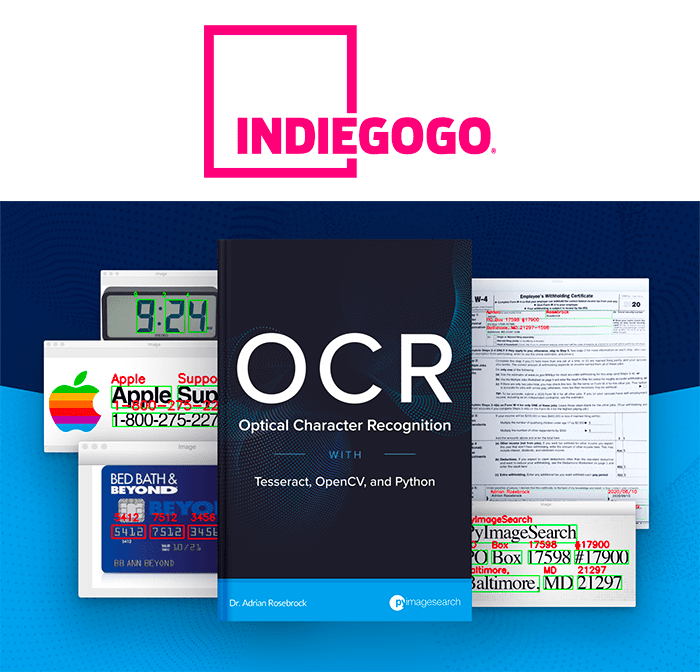
So, why am I writing a book on OCR?
- Despite all the advances in deep learning, OCR is still incredibly challenging.
- Tools like Tesseract are cumbersome, hard to use, and provide few tutorials or documentation
- And not to mention, integrating OCR and Tesseract into your own OpenCV projects can leave you pulling out your hair (I should know, I’m bald).
My new book demystifies OCR, allowing you to successfully and confidently apply OCR to your work, school projects, and research.
What will be covered in the book?
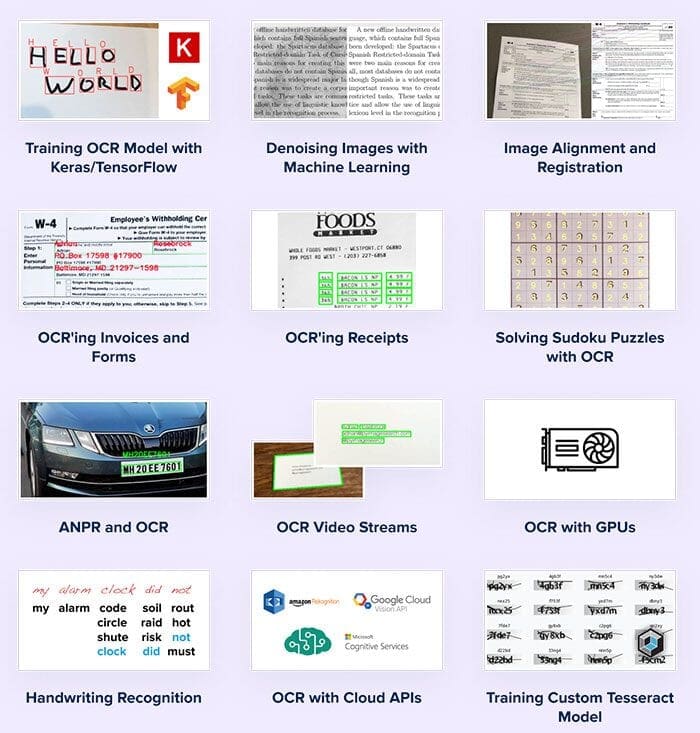
My new OCR book:
- Covers the Tesseract OCR engine
- Shows you how to tune all the knobs and dials of Tersseract to improve OCR accuracy
- Teaches you how to integrate Tesseract with OpenCV in your own projects
- Provides chapters on training custom OCR models from scratch
- Utilizes deep learning to create OCR models on your own custom datasets
- Shows you how to use cloud-based OCR APIs, such as Amazon Rekognition, Microsoft Cognitive Services, and the Google Vision API
Additionally, I’ve included a number of case studies on:
- Building an OpenCV Sudoku solver
- OCR’ing a form document such as an invoice, resume etc.
- Creating a receipt scanner
- Building an Automatic License/Number Plate (ANPR) system with OCR
- How to apply OCR to video streams
- How to improve OCR speed with your GPU
- Training a Tesseract model from scratch
- How to use Keras and TensorFlow to train custom OCR models
- …and more!
Certificate of Completion
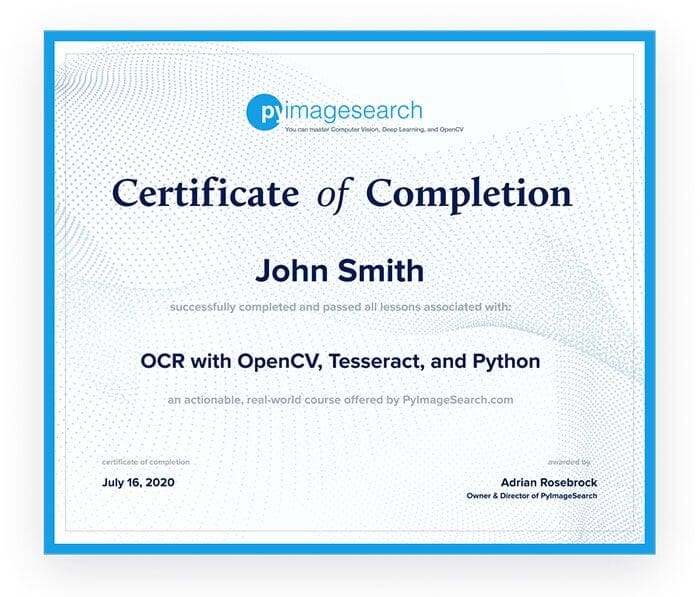
This book will include a Certificate of Completion option. After successfully completing the quizzes and assignments for each lesson in the book, you will be awarded a certificate of completion which you can included on your LinkedIn profile, resume, etc.
Why IndieGoGo? Didn’t you use Kickstarter for previous campaigns?
Long-time PyImageSearch readers will note that I’ve launched three crowdfunding campaigns in the past (one for the PyImageSearch Gurus course, one for Deep Learning for Computer Vision with Python, and another for Raspberry Pi for Computer Vision). All three of these were launched using Kickstarter, a popular crowdfunding platform.
That raises the question — why use IndieGoGo over Kickstarter?
There are two reasons:
First, the Kickstarter platform is buggy. I’ve reported a number of bugs to Kickstarter over the past four years using their platform. These bugs were never fixed. And to be totally candid, I’ve started to lose a bit of faith in Kickstarter.
But more importantly, Kickstarter makes it confusing to offer multiple discounts and deals. When I ran the Kickstarter campaign for Raspberry Pi for Computer Vision, the single biggest point of feedback was that the checkout process was confusing.
IndieGoGo has a much more intuitive, straightforward checkout process, allowing you to:
- Grab your copy of OCR with OpenCV, Tesseract, and Python at the exclusive pre-launch pricing
- Additionally purchase copies of my other books and courses at discounted rates (if you choose)
My goal is to make it as easy as possible for you to take advantage of these deals and discounts — and when I tested the IndieGoGo platform, it was a no-brainer.
I was afraid to fail.
Back in February 2015, I launched my very first Kickstarter crowdfunding campaign. This campaign was for the PyImageSearch Gurus course, which has now become the best course online to learn computer vision, deep learning, and OpenCV.
But let me tell you, that Kickstarter campaign almost never launched.
No one knows this, but back in November 2014, the startup I was working for lost our funding. We had a government contract with the State of Maryland, and when the state election resulted in the governorship changing hands, the governor-elect canceled our contract immediately.
Here I was, fresh out of graduate school, PhD diploma in hand, and I was already out of work!
I was at a critical juncture at that point in my life; I could go out, find a new job, and continue on the same path…or, I could figure out a way to make PyImageSearch my full-time job.
I chose the latter.
I put my back against the wall and hunkered down for what I knew would be a fight for my life.
I knew the blows were coming. I felt like Rocky Balboa fighting Apollo Creed…but if I could withstand the punches, I could succeed.
But let me tell you, a punch is still a punch — and it hurts.
Bills were piling up. I had just moved in with my girlfriend (who would become my wife, a few years later). I was up against the ropes. I had my mitts up to protect my head, but I was taking body blow after body blow. If my hands were to fall, I knew I was out — I couldn’t take a punch to the head.
Leading up to the PyImageSearch Kickstarter campaign I was a nervous wreck. I barely slept in the four nights before it launched.
I was jittery and anxious. My left eye was twitching. I had constant catastrophic “what if” thoughts:
- What if I can’t pay my bills?
- What if I go broke?
- I just moved in with this girl that I love — what if she leaves me because this career decision doesn’t work out?
What I failed to realize, but what I know now, is regardless of whether the PyImageSearch Gurus course was a success or not, I was still going to wake up the next morning. Life was going to continue.
- If it was a success, great! I would have clear stepping stones to running PyImageSearch full-time.
- And if it failed, at least I learned something. Yeah, life would be a bit harder for 6-12 months as I found a new job and paid back debt, but realistically, I was only 24 at the time. I had more than enough time in my life to recover from that punch.
Too often I see developers, students, and researchers convincing themselves not to learn a new skill because they are afraid of failing.
I learned something from that Kickstarter campaign six years ago — the biggest failure on my part would have been not to launch it.
If I would have given in to my fear of failure and pulled the plug at the last minute, then the PyImageSearch Gurus course wouldn’t exist.
And if that course didn’t exist, well, it’s very likely that PyImageSearch wouldn’t exist either. The success of that course brought in the students and the money necessary to grow PyImageSearch to what it is today.
In my opinion, the only true failure is failing to invest in yourself physically, mentally, and educationally.
- Invest in your body, it’s the only one you have. It needs to last you 70+ years. Workout often, eat healthy, and drink lots of water. Learn to reduce (or eliminate) alcohol and caffeine consumption. Get 8 hours of sleep every night.
- Invest in your mind and keep it sharp. Meditate before bed and first thing in the morning. Utilize a daily gratitude journal. Let go of your ego and apologize when you hurt another people’s feelings (even if you know you were right and justified). And most importantly, celebrate the people in your life that mean the most to you. Put them on a pedestal and make them feel wanted, special, and remarkable.
- Invest in your education, it’s what keeps you young (literally). Studies in neuroplasticity (i.e., your brain’s ability to modify connections and rewire itself) show that stimulation via education helps reduce the risk of dementia, Alzheimer’s disease, and other brain degeneration conditions. Even if you are older and retired, you still need to learn to keep that brain young! And if you’re younger, there’s simply no excuse for not investing in yourself and your education — it’s important not only for your career, but for your long-term health.
What’s next?
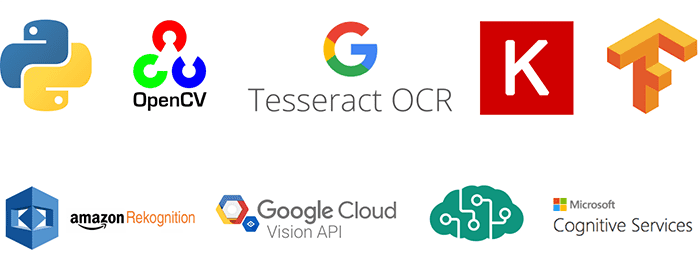
OCR is one of the most challenging sub-fields of computer vision and deep learning. While a simple, intuitive concept, OCR has still yet to be “fully solved”. No off-the-shelf OCR package exists that is 100% accurate and works in every use case/situation.
My book will teach you how to successfully and confidently apply OCR to your own work, projects, and research. I guarantee that. Please consider joining me and grabbing your copy of my new book at the exclusive discounted rates.
Click the button below to claim your pre-ordered copy:
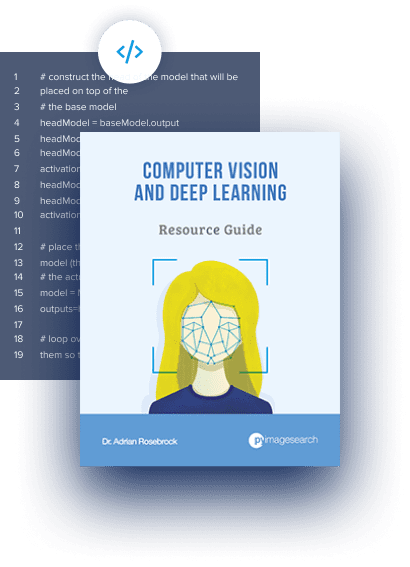
Join the PyImageSearch Newsletter and Grab My FREE 17-page Resource Guide PDF
Enter your email address below to join the PyImageSearch Newsletter and download my FREE 17-page Resource Guide PDF on Computer Vision, OpenCV, and Deep Learning.
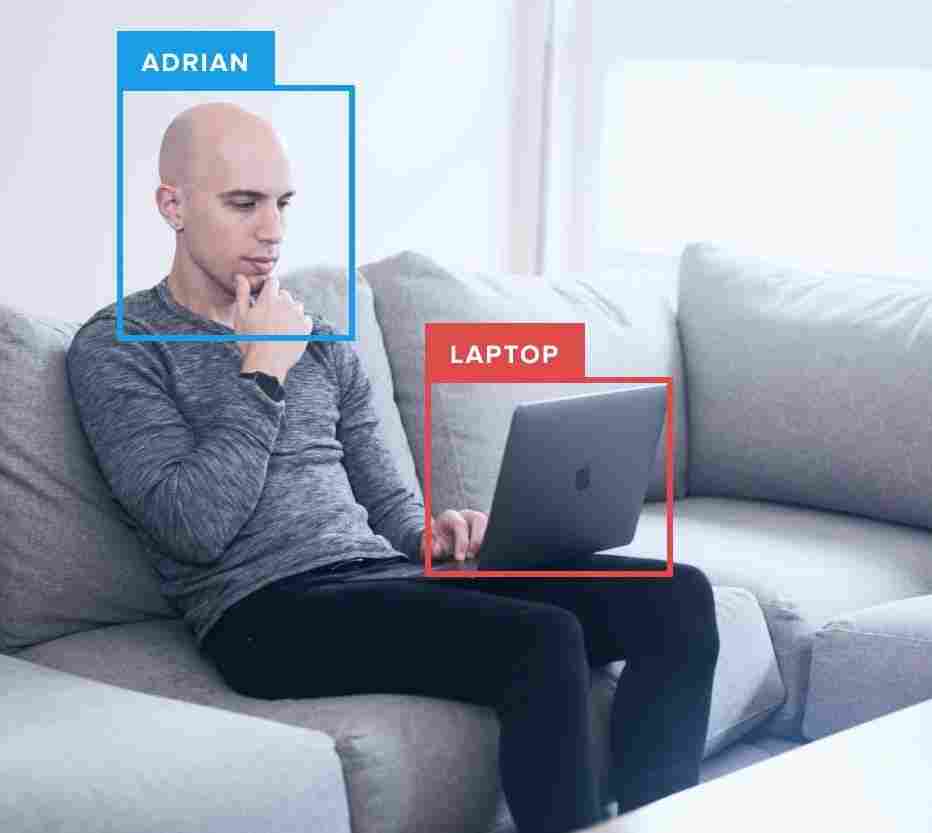
Comment section
Hey, Adrian Rosebrock here, author and creator of PyImageSearch. While I love hearing from readers, a couple years ago I made the tough decision to no longer offer 1:1 help over blog post comments.
At the time I was receiving 200+ emails per day and another 100+ blog post comments. I simply did not have the time to moderate and respond to them all, and the sheer volume of requests was taking a toll on me.
Instead, my goal is to do the most good for the computer vision, deep learning, and OpenCV community at large by focusing my time on authoring high-quality blog posts, tutorials, and books/courses.
If you need help learning computer vision and deep learning, I suggest you refer to my full catalog of books and courses — they have helped tens of thousands of developers, students, and researchers just like yourself learn Computer Vision, Deep Learning, and OpenCV.
Click here to browse my full catalog.